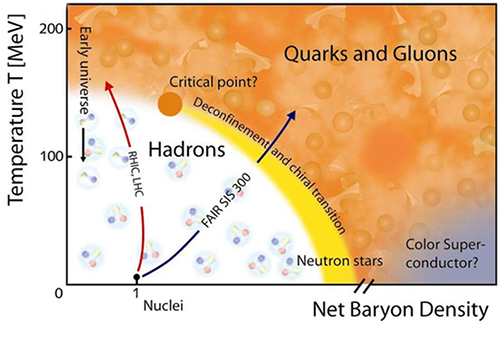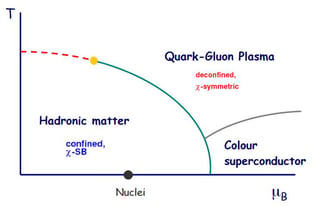I have read this question:
The difference is that the quark-gluon plasma is governed by the dynamics of the strong interaction, which isn't very well understood, so that's what people are interested in when they talk about it.
How did photons and electrons arise out of the quark-gluon plasma?
And this one:
Is it sensible to talk about protons at the time when the universe was a quark-gluon plasma?
At high temperature there’s so much energy shared among particles that bound states are not likely to occur. Below a certain critical temperature the bound states are suddenly much more likely. This is a phase change similar to freezing.
If quarks can't be isolated in the first place, how did they become confined in the early universe?
Snapshot of a proton -- and imagine all of the quarks (up,down,and strange -- u,d,s), antiquarks (u,d,s with a bar on top), and gluons (g) zipping around near the speed of light, banging into each other, and appearing and disappearing. (M.Strassler 2010)
Why do the quarks constantly change colors?
None of these give satisfactory answers as to how exactly the quark gluon plasma prevents quarks from forming protons. I have two main possibilities:
in the early universe, quarks had extremely high kinetic energy and thus the strong force was not able to keep them in confinement. But I cannot explain this any further, as the gluons are massless, however fast the quarks are moving, the gluons are still (as viewed from the massive quarks' frame) moving at the speed of light, so no matter how high the kinetic energy of the quarks is, the strong force is still mediated between them by gluons. As far as I understand, quarks are already moving near the speed of light inside the proton, yet they can still be confined.
in the early universe, spacetime distances between quarks was shrunk to very small scales, and as we know, the strong force becomes repulsive at short distances, thus, protons were not able to form. I cannot explain this any further either, because the strong force becomes repulsive (at short distances) at the current state of the universe, but maybe it was different at the early times.
Question:
- How exactly does the quark gluon plasma prevent protons from forming?


